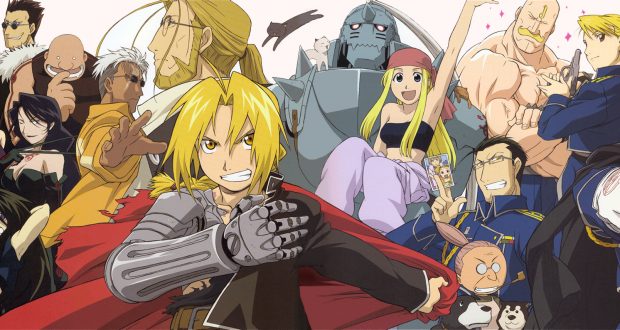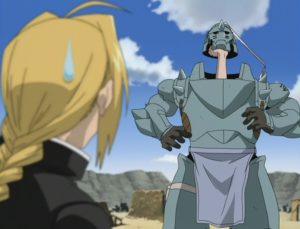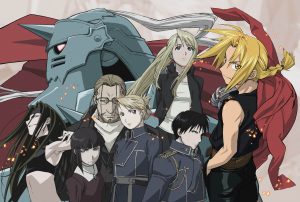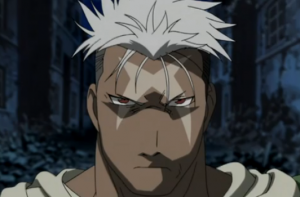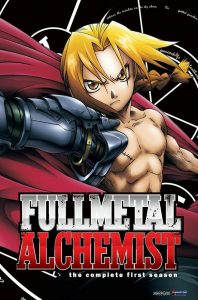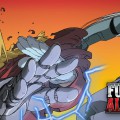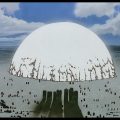Fullmetal Alchemist is now on Netflix. About time. The 2003 anime is one of my favourite series. The lack of availability has been a source of frustration as it is unreasonably hard to find a legal copy of the DVD-boxset is at a fair price. Within hours of the anime dropping, I have managed to bully several people into watching it. What they will doubtlessly find is a deeply rewarding and very emotionally charged series. Fullmetal Alchemist (FMA) was an acclaimed and popular series by any standards in its day, yet has until now been hard to access. The reasons behind this make for an interesting story.
Fullmetal Alchemist takes place in a world where certain individuals are trained in the pseudo-scientific craft of alchemy. They transmute elaborate objects and effects from basic principles. When the two young brothers Edward and Alphonse Elric lose their mother, they resolve on transmuting her back to life. Their forbidden experiment gruesomely backfires. The attempt consumes Edward’s left leg and the entirety of Alphonse’s body. In an act of desperation, Edward sacrifices his right arm to bind Al’s soul to a suit of armour. Stitched together with steampunk prostheses and inhabiting a hollow suit of armour, Edward and Al embark on a quest to restore their bodies.
“Humankind cannot gain anything without giving something in return”
Some readers might be tad confused as to my whinging about the absence of the anime series from several major streaming services. They will be sure they saw it as they passed through Netflix or Crunchyroll sometime in the past. Not quite true. There are in fact TWO separate series: the superior 2003 series and Fullmetal Alchemist: Brotherhood. Brotherhood is a remake which adheres much more closely to the manga. FMA 2003 deviates from its source material drastically after the halfway point. It was the original writer who requested this. The mangaka Hiromu Arakawa personally asked that the on-going series have a different ending from her manga run.
The deviation from the source material and the arrival of Brotherhood are largely why the 2003 series has been eclipsed. As popular as the first run was, Brotherhood came afterwards and performed just as well if not better. It appeased a certain demographic of manga purists who wanted to see Hiromu Arakawa’s manga properly put into motion. Advances in animation and a higher initial investment meant the more action-packed latter series had more elaborate fight scenes. There is also more of Brotherhood. The FMA 2003 boasts 51 episodes and a subsequent film. Brotherhood has 64 episodes and its own follow-up film. For people wanting to binge on a world and characters they adore, Brotherhood simply offers more to glut on. Due to this, and a somewhat messy distribution history, FMA 2003 has been overlooked in favour of its younger sibling in recent years.
“To obtain, something of equal value must be lost”
And yet, I firmly believe it to be the better series. Not that Brotherhood doesn’t deserve praise but it has several detractions. For a start, the initial segments of both series cover (more or less) the same material. Coming out only 6 years after its predecessor, the producers of Brotherhood decided that viewers wouldn’t want to dwell on the bits that established fans already knew. The first segment of Brotherhood is therefore a more rapidly abridged retelling of the first half of FMA 2003. The series certainly improves after the point of deviation but there is still a different ethos behind the series. Bluntly, Brotherhood is bigger, louder, more action-packed and blander.
I am speaking from what feels like a minority position because Brotherhood seems the more adored of the two. But the discerning fan knows which series is more sophisticated. I don’t mean to be a snob [Editor’s note: this is an utter lie] but Brotherhood appeals to fans who like a shallower and flashier experience. It feels much closer to an archetypal shonen fighting anime. In part because it rushes through its initial material, Brotherhood never reaches the peaks of FMA 2003’s emotionally-wrought story telling. The first series can be downright creepy, moving and jubilant. Compare against Brotherhood which is far more concerned with deferring to bombastic action (in part because they had the money to indulge in big fights) and in which those same notoriously harrowing episodes land so much more flatly.
“That is Alchemy’s First Law of Equivalent Exchange…”
Some will balk at this, of course. They will point to the supposed complexity of the latter half of Brotherhood that cleaves closer to the manga. I must contradict this. It is certainly true that Brotherhood performs far better when it is breaking new ground. It doesn’t have to compare to a predecessor against which it will be found inferior. But so much of that supposed complexity is because the manga and Brotherhood pile in so many more characters and alterations to the mechanics of alchemy. Brotherhood is certainly bigger in scope but it mistakes more tertiary characters, locations, and denser lore as genuine complexity. Often these elements are just heaps of nonsense to enable arbitrary twists, delayed resolution, and more fighting. FMA 2003 is certainly more streamlined in not juggling as many plot elements but it is also a more human story that is far more emotionally complex. FMA 2003 always defers to character relationships and personal conflict as the core of its story, Brotherhood views these as secondary to presenting a big showstopper.
Now, you could do well watching Brotherhood. It is, as I said, not a bad show. But if you overlook the older run, now more readily available than ever, you miss out. You miss out on a series that offers you touching moments of compassion and friendship, that is telling personal stories in a world of cold-hearted conspiracies and of the implacable warmongering of nation-states. You miss out on a rich fantasy world with the richest versions of its characters. You miss out on some of the most iconic moments in anime history, encompassing tragedy, redemption and even horror. You miss out on a story driven by the consequence of people’s actions and the impact of their psyches. Above all, you miss out a well-crafted narrative that will deliver characters who you will fall in love with.
I cannot recommend it enough.
 Pop Verse Pop Culture Universe
Pop Verse Pop Culture Universe
